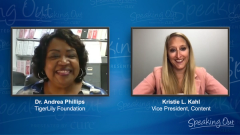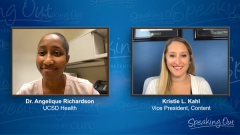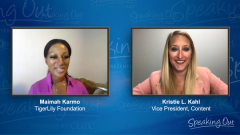
Finding Support After a Breast Cancer Diagnosis
CURE spoke with Maimah Karmo, founder and CEO of the Tigerlily Foundation, about support after a breast cancer diagnosis.
Kristie L. Kahl: A cancer journey can be an overwhelming experience. But can you discuss the role of the caregiver following the breast cancer diagnosis?
Maimah Karmo: That's a great question. Caregivers play a really important role. And they're oftentimes overlooked. My mom is a nurse. And when I was diagnosed, she was working a full-time job. And I got so sick, I had to move back home with her. My grandmother then lived with her. … She's working a full-time job in her 50s taking care of her older mom, her first born child, myself, or an adult child, and my 3-year-old daughter. And as immigrants, we have other people living in our home as well. So, she had a lot on her plate. I don't know how she did it, because she had to work again, take me to treatment, when I couldn't drive or when I didn't feel well, take care of me post treatment.
But also, being a mother, seeing your child with her cancer was terrifying. And being a nurse where you know all too well what could happen as an end result of a late diagnosis. So she was highly anxious, very exhausted. And I wish I knew then how to help her. But I didn't know until afterwards. And so now I pamper her a lot. Take her out to lunch on the weekends, get her massages, and you know, I take care of her. Because she took care of me as a as a child, but also as a person going through cancer.
So I would say, just love the caregiver. They need attention and affection, they need to know that they have support as well because people who are caregiving are also ones who are going to say, “I'm good, I got it. I'm okay.” But they're not okay. My mother had a lot of anxiety for a long time. After she would call me and say “I want you to get rest. I want you to sleep.” I'm like, “Mom, I'm fine now.” But she was just afraid for her child. And so I just think that my gift to her and others caregiving, you love them and support them throughout their journey as a loved one.
Kristie L. Kahl: How can friends and family also play a supportive role for patients?
Maimah Karmo: Breast cancer gets a lot of attention and a lot of support in many ways. People don't really understand what it's like to live in a body that's betrayed you. People are going to say, “I love you,” and they do love you, and “I'm going to be there for you. What do you need help with,” But you often don't know what you need help with. You're just trying to get through cancer. So just showing up is one thing. Don't ask me to show up and say “I'm here, what can I do now?”
Late nights can be really hard, (when people are going to sleep), you're laying there in your body wondering “Is the cancer coming back and what's happening to my body?” I'm looking at how to help people pay bills, it's not even just the monetary aspect of it, but also negotiating. I remember getting into treatment and having all these different bills to pay and having to work a full-time job and care for my daughter as well. So I ended up with two bags of bills after treatment, of just little things here and there. It was so much to juggle: pay my bills, paying for my treatment and parenting.
So what can you do to help balance the daily activities and running errands, getting back and forth for treatment plus appointments. (And when treatment ends), it can be more agonizing then the chemotherapy process, (because) … you get there and (people are) like, “Oh my god, we're just happy for you and we're glad you're done,” then the support goes away. But for a cancer patient there is not really an end. You have a life of living with a body that's had treatment, so survivorship is a challenge. I'm a very positive person and very strong. But there are times when you get afraid, and especially after treatment ends. You're tired, you've had surgery, which, for your body, can be traumatic and you've had chemotherapy and/or radiation. So really, when that treatment ends is when people should still be asking “What's the next phase you need help with?” I had (a friend) live nearby. She would take my daughter on the weekends and I was asleep for like 16 hours. I was exhausted. So she was my lifesaver at the time…
Kristie L. Kahl: Similarly, can you discuss the care team from a multidisciplinary approach? How can we help to support patients with breast cancer?
Maimah Karmo: I always say that for every point in your life, you're going to get different kinds of friends, sometimes we'll be able to be with you throughout your entire life throughout everything you need. But as your life changes, you're going to have different people that get where you are. And so much like in the cancer journey, you know, there's friends who are going to rally with you throughout the whole time, be there when you're throwing up and hold your hair up and be with you. There'll be friends who will be helping you to navigate your bills, maybe one of my friends helped me get my treatment, pick my doctors, I was overwhelmed, I was so frazzled, and I couldn't think straight and she's like, “Give me your driver's license, give me your all your permission.” She called, got me appointments scheduled for me. One friend took me to treatments here and there. So it's really looking at your home support, what you need at home. Most women are very strong. They're going to say I'm fine. But don't take that for an answer. …
And also, when you picking your healthcare provider team, that team is going to be the one that's going to have to fight for your life with you. So don't take that lightly. Or just pick someone because you're scared, and want to start treatment quickly. Pick a team that you know will fight for you, will search for treatments in trials for you, will remember to call on the weekends, to be in the trenches with us.
Kristie L. Kahl: Why is it important for patients to lean on these support systems?
Maimah Karmo: It's important because no one prepares you for cancer, right? I know that I'm very strong, and I thought I got this, I'm not going to lose my hair, I'm going to be okay, I'm going to get through chemo and still go for runs and jogs and still work my job and do things that I could do before. But at some point, when I lost my hair, and my body began to do things where I couldn't get out of bed, sometimes I was really tired. And I would read books, and I would pray and I still feel awful. And I'm like, oh my god. So there comes a time when you're just so afraid of what's happening to you that it's sometimes beyond your control. That's when the Calvary can step in. I have friends who would pray for me all the time. My friends who would come by with little gifts, even when I was depressed, he wouldn't go away. I had friends who would just come and take me out my birthday that year and say, you're having your birthday, you got to get out of the bed, we're going to celebrate your birthday, and you're going to enjoy the meal or not. But you're going to get out there and live your life because you're still here. And they got me through that initial fear and depression phase.
But also telling people what you really need is really important. Because, you know, we've been taught that you get through cancer, then you're fine, but it's a lifelong journey. I have effects I live with like some neuropathy, and my lungs, I think are scarred from the treatment or radiation. So I have a chronic cough sometimes, and I get scared. But I have a headache, I get scared. So, you know, my close friends know me enough that when I say I'm fine, they're like, Yeah, no, you know, or if I lose a friend to breast cancer, you know, it is deeply painful. These people are not going to just my patients, they're my friends as well. And I love them. So it's dealing with the life of your body, having in some ways betrayed you, but knowing that is still working for you in many ways. And then also people that you've lost, that takes a toll. So all my friends are people that are great. They pray with me, we pray together for each other. And they're also compassionate. So pick people that are going to be there for you through thick and thin and know that no one you're saying you're strong and you're not. And it will love you either way, right? Love you through all of that.
Kristie L. Kahl: Does TigerLily have any resources for caregivers and loved ones?
Maimah Karmo: It's all about that heart centered approach to getting people through cancer. We have support for caregivers. We offer what's called care coaching for patients and their loved ones. We have financial assistance for people that needed we also do We have a 24/7 prayer line, I think you have to think about how to make spirituality and soul in science, science and soul. So we offer people treatment options and support and just thought things through treatment, but also how to deal with the emotional effects of cancer. So the Spirit, the Spirit, the 24/7 prayer line is waiting call and get prayer whenever you want throughout the day, it's totally free. And we do spiritual blogs, and just we have a spirit retreat as well. So whenever the person needs to treatment, We even offer therapy through our external therapy associates. So whenever the person needs to add treatment, peer support, financial assistance, someone to pray with them, a blog to read a way to journal that through their thoughts, they offer that and we also offer the coaching for those who are loving those who are dealing with cancer as well.






